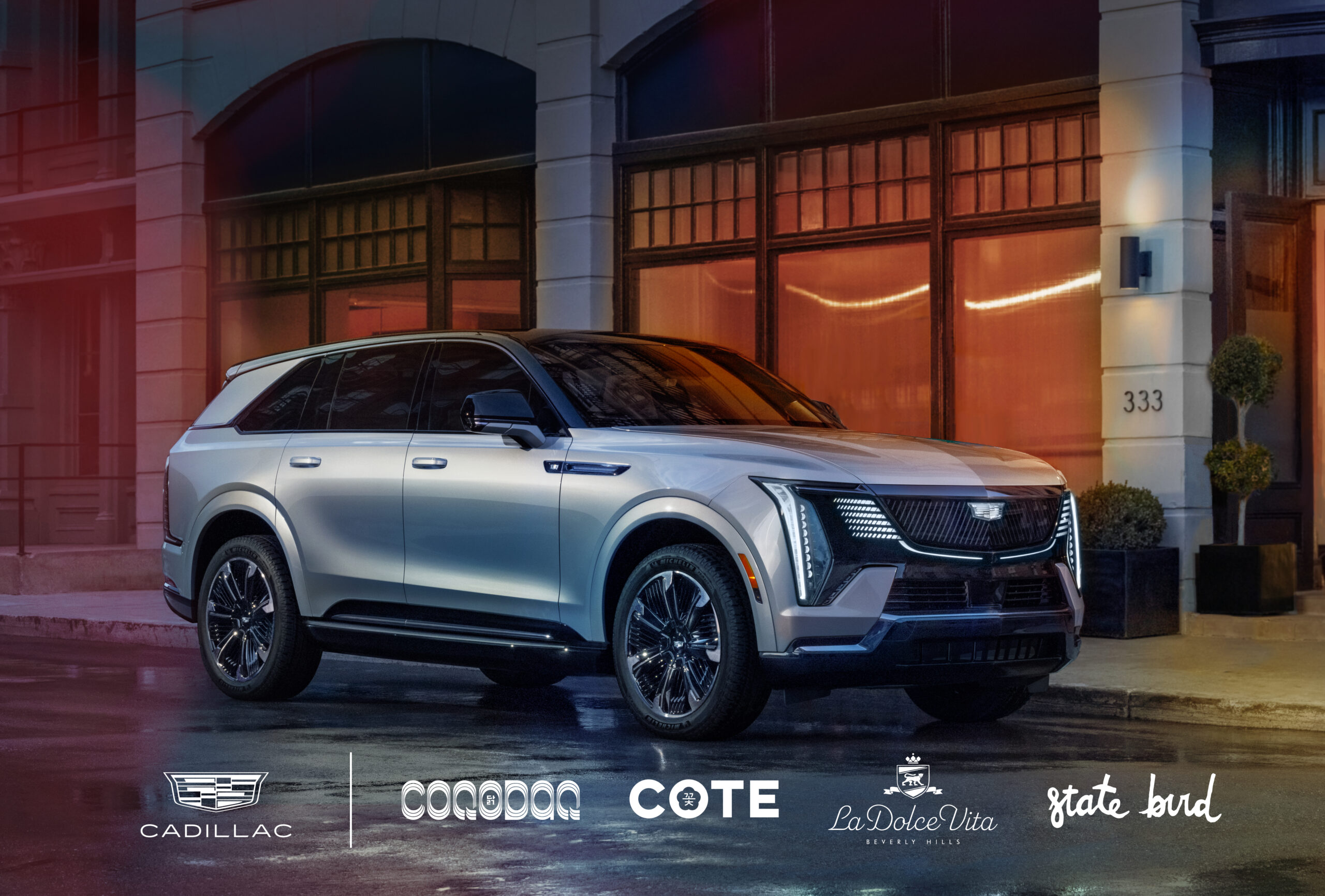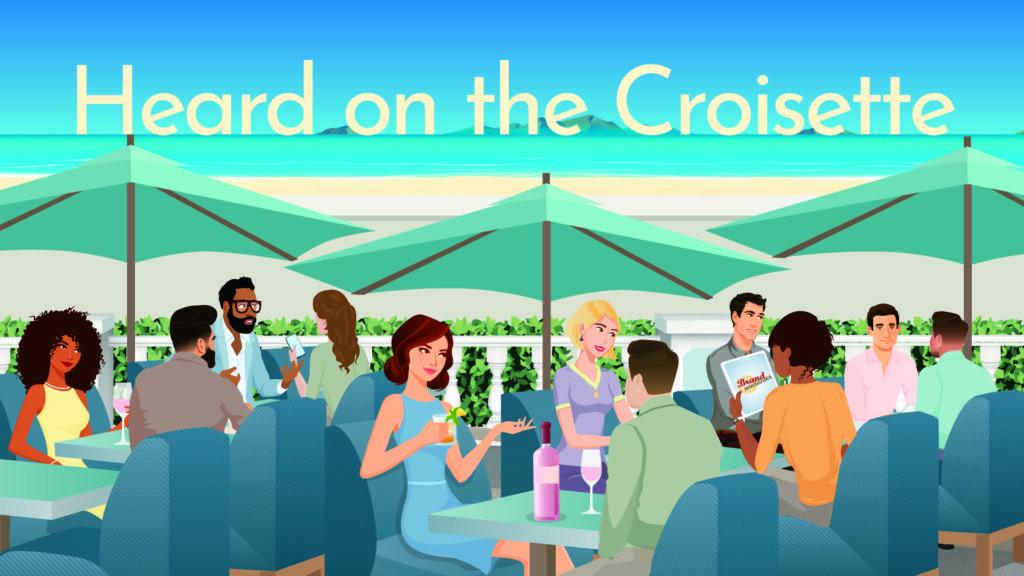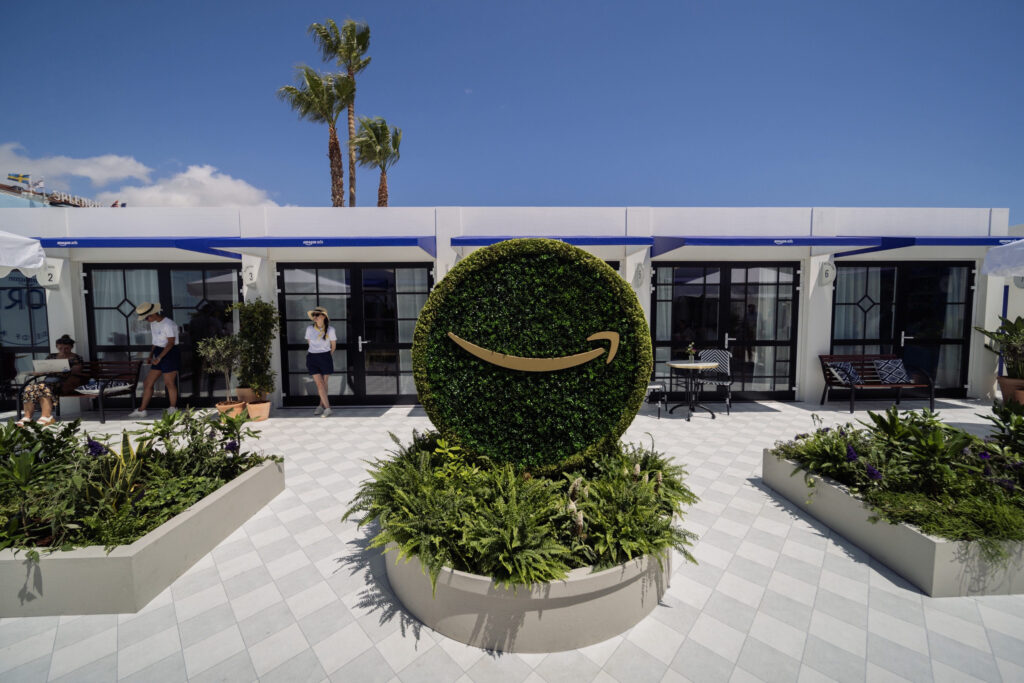An old saying argues that the way to a man’s heart is through his stomach. Automobile marketers are betting that holds true, especially when it comes to selling luxury cars. They are using dining experiences to reach consumers who increasingly shop outside a dealership.
“Food is a direct connection to lifestyle” and culinary experiences hit many aspirational touch points, said Simon Fletcher, vice president, experience strategy & design at the experiential agency RAPP. “Food is just another one of those cultural connection points that people want to aspire for.”
It’s all part of a focus on experiential marketing, driven by changing customer profiles. Auto makers are increasingly showing up at music festivals, sports events and fashion shows in an effort to attract Gen Z consumers who surveys show are less interested in purchasing automobiles. And even when they decide to shop for a car, these consumers are less likely to go to a showroom.
Auto makers “are reimagining the in-person experience” as the automotive space is disrupted, much like other retail-based businesses, said Fletcher. Dealerships are being reinvented as experience centers and food is part of an increasingly tactile experience. “They’re not building the typical brick-and-mortar traditional dealership,” said Fletcher.
Three-quarters of car shoppers still buy from a dealership, but 28% are buying cars online, and that practice is even more popular among younger demographics. In fact, the early steps in car shopping are increasingly being done online, so getting consumers into a car for a test drive is a tougher sell.
“It’s all about putting ‘butts in seats,’ and this is a unique and innovative way to do just that,” said Mike Schott, President of Volta Media, a retail media network built around Shell electric vehicle charging stations. “There are some great parallels between cars and cuisine, especially luxury cars and fine cuisine.”
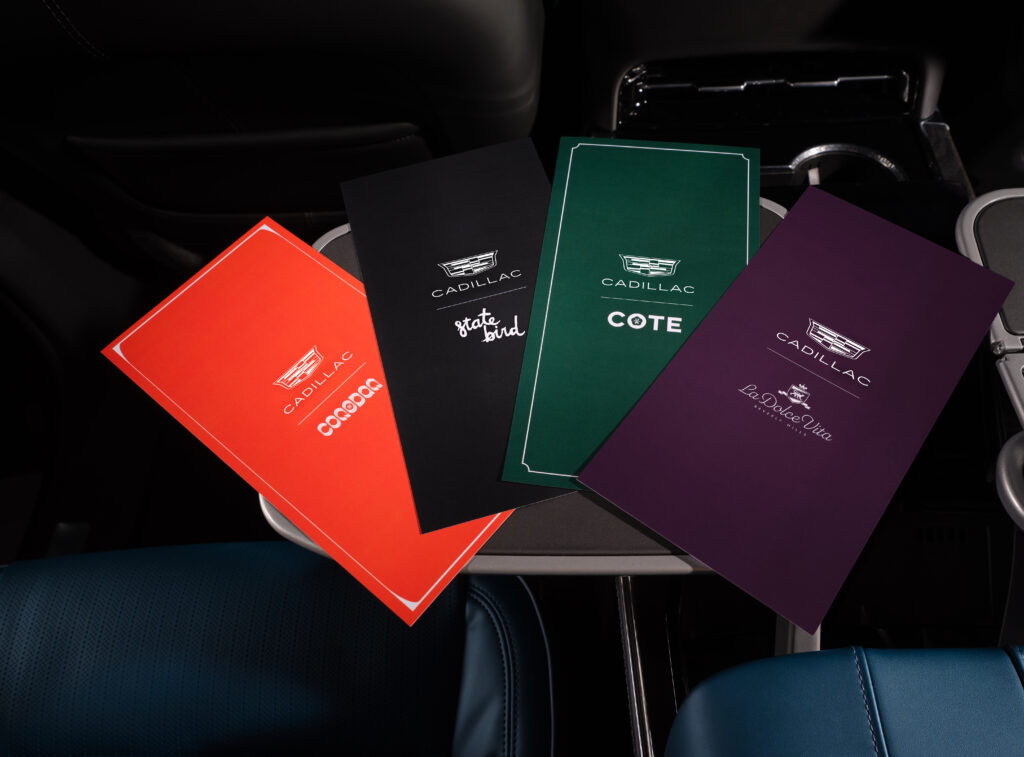
A taste for storytelling
In common parlance, “The Cadillac of…” is often used to refer to top-notch items, so the car brand used it to tag a dining experience where it partnered with hot restaurants. “The Cadillac of Reservations” offers a limited number of dinner seatings, featuring that eatery’s most iconic dishes, served on board the new electric Escalade IQ luxury SUV. The activation launched in New York in partnership with the restaurant COQODAQ, and recently expanded to Los Angeles, Miami and San Francisco.
“We wanted to think outside of the showroom and the typical ways to reach a potential buyer,” said Melissa Grady Dias, Cadillac Global CMO. A dining experience builds awareness with a wider range of consumers who may not be thinking of a Cadillac, she explained: “A public-facing activation, where the vehicle is placed in a high-foot traffic area, naturally draws in attention from locals and restaurant goers.” And by drawing attention to the top-of-the-line, it also can bring in prospects for the more accessibly priced models, too, she added.
“We wanted to reinvent the possibilities of where an Escalade can take you,” said Grady Dias. “Partnering with the country’s top restaurants with hard-to-get reservations, allows Cadillac to be included in the buzz and reach their similar audiences who seek out luxury experiences.”
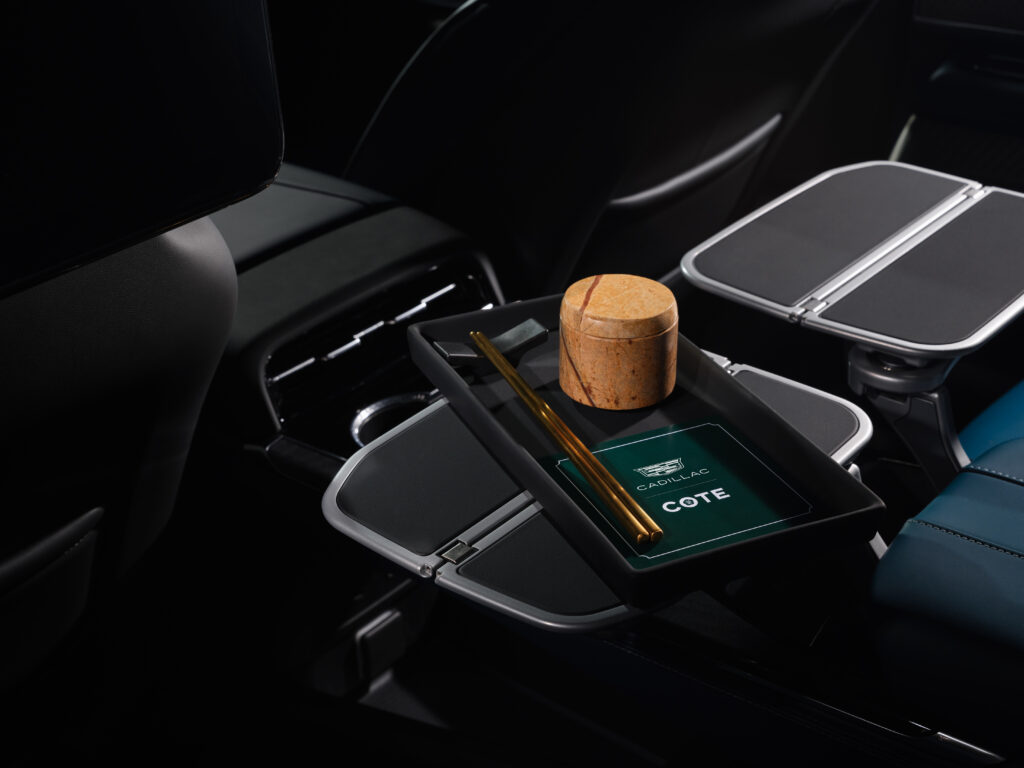
The brand has experience pairing dining with automotive branding. When Cadillac moved operations to New York in 2015, its Cadillac House headquarters included an experience center and cafe. The facility closed when the brand moved back to the headquarters of parent General Motors in 2019, but the experience was replicated in its Detroit facility.
“As a brand that champions big dreams and bold ambitions, we are always looking for new and innovative ways to reach customers,” said Grady Dias.
Cadillac is not alone. Many high-end automakers blend culinary experiences into their branding.
In between factory tours and laps in the test track, visitors to Ferrari’s headquarters can eat at Ristorante Cavallino, a Ferrari-themed trattoria started in 1950 by the automaker’s founder, Enzo Ferrari. (Cavallino, Italian for “little horse” is a nod to the carmaker’s “Prancing Horse” logo.) Porsche offers fine dining restaurants named after iconic models in its Porsche Experience Centers in Los Angeles and Atlanta, where drivers can dine after demonstration laps on the track and rides in racing simulators. Lexus partnered with restauranteur Danny Meyer in 2018 to open Intersect By Lexus, a “permanent pop-up” in New York featuring exhibit spaces and fine dining. The venture closed down during the COVID-19 pandemic, but the brand’s Tokyo flagship is still in operation.
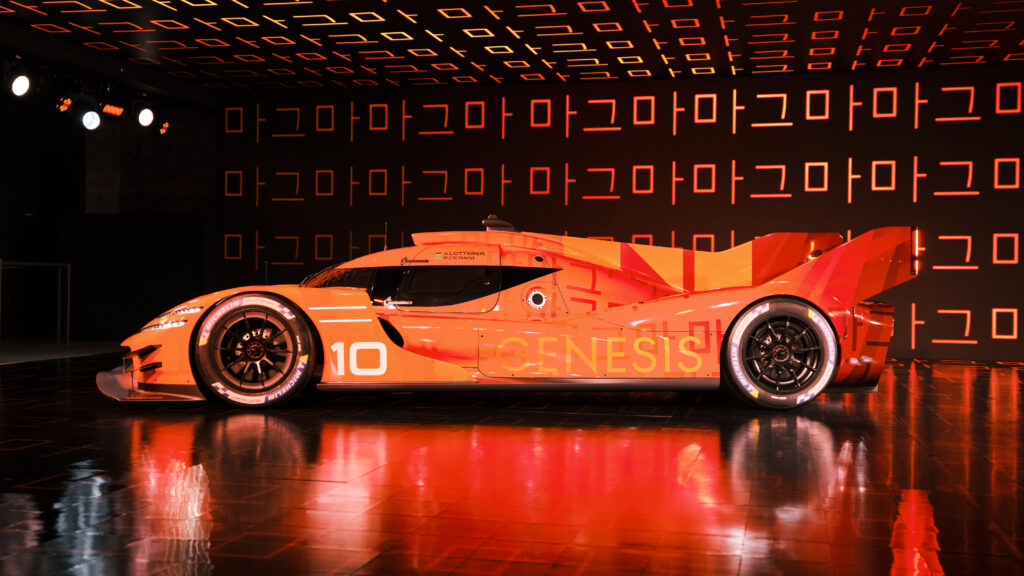
Just recently, during the New York Auto Show, Genesis—the newer, luxury brand of the Korean automaker Hyundai—introduced the Gran Equator all-terrain luxury SUV at the restaurant and event space of its Genesis House showroom. Hyundai opened Genesis House in 2021 in the trendy Meatpacking district as a brand showcase, including a fine-dining restaurant serving upscale Korean specialties and a tea pavilion. It used the space for a number of fashion- and art-related activations and in summer 2024, the restaurant partnered with the Michelin Guide in the Hamptons for a “Culture as Cuisine” dining experience in the New York beach resort popular with celebrities and the one percent.
Genesis House is more than a traditional showroom, but a cultural destination, and the restaurant helps differentiate Genesis as a brand that values design, storytelling, and culture, said a spokesperson. Dining is a form of cultural storytelling for the Korean brand, which is relatively new to the U.S. market.
“Fine dining invites consumers to immerse themselves in the brand,” said the spokesperson. “It allows guests to slow down and experience the richness of modern Korean culture, from its artistry to its deep sense of hospitality.”
The relative newness of the brand gives Genesis an opportunity to define its identity outside the traditional automotive marketing playbook, said the spokesperson: “It’s about building connection through experience.”
Many of these activations are designed to amplify coverage and digital engagement, Fletcher explained. “It does create more buzz, doing a different kind of experience or stunt in an unexpected way,” he said. “It does get your influencers talking about it.”
But these experiences are tied to defined goals beyond social media clout, said Fletcher. In Cadillac’s case, it’s about highlighting the interior features of the new Escalade, while Genesis uses food as an entry point into Korean culture and the roots of the brand.
Car buyers have a relationship with their vehicle, so a lifestyle angle makes sense for marketers, Fletcher noted. For example, Lexus, a RAPP client, sponsors culinary events as part of its LexusCare owner community.
“Sometimes it’s about enhancing the experience that becomes an aspiration: if I buy this vehicle, I’m buying into this lifestyle as well,” he said. “And they bring it to life in certain ways.”
